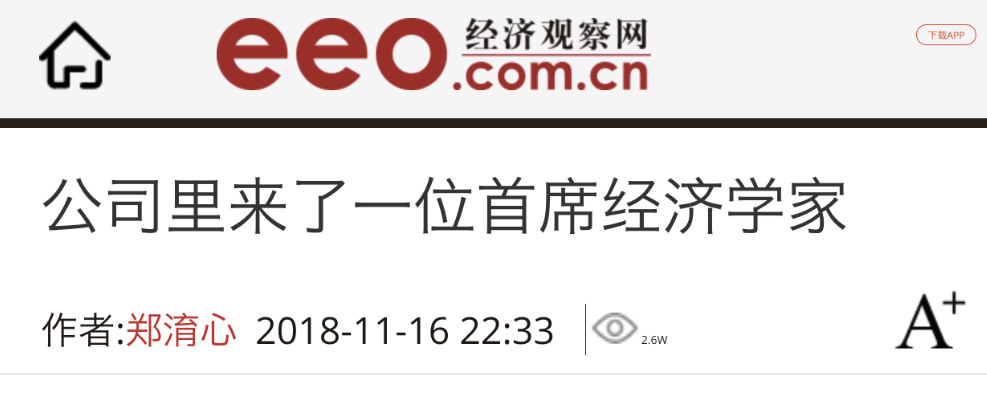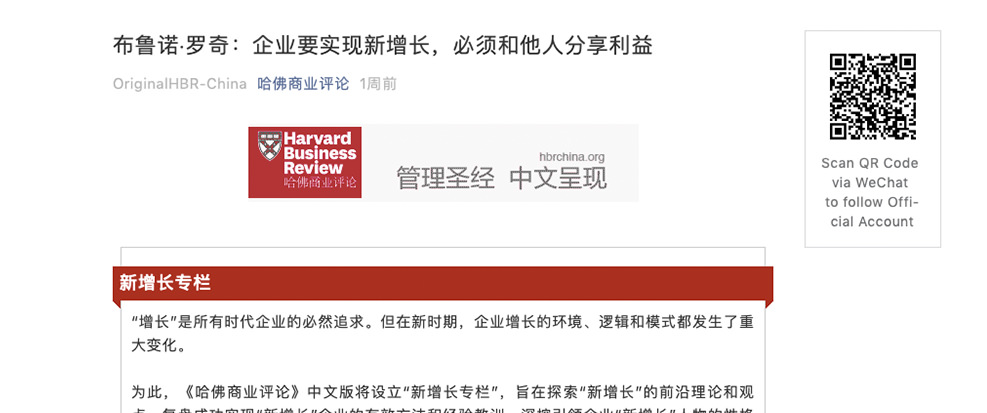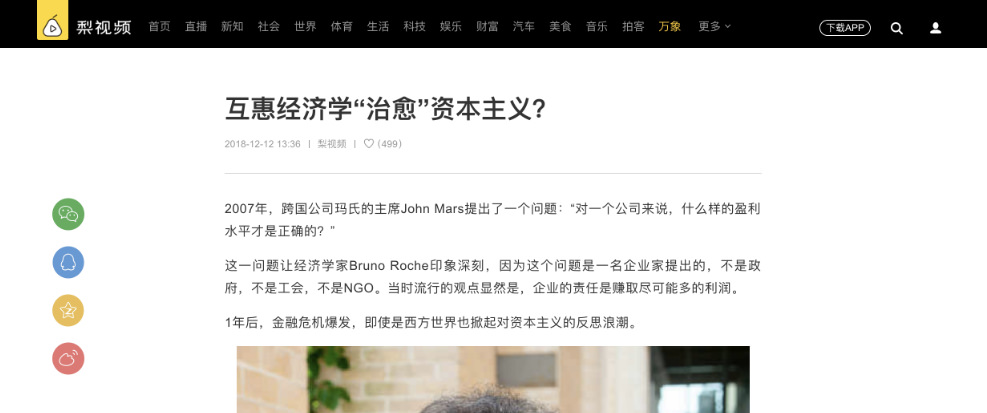High Profile Chinese Media Interviews with Bruno Roche
Published December 2018
In November, several top-tier Chinese media outlets published in-depth interviews with Bruno Roche following his keynote speech at the CITIC Frontier Forum in Beijing, where he presented on the Economics of Mutuality. Qin Shuo, an influential thought leader in the world of business and finance, interviewed Bruno and published a feature WeChat piece. Links to the various articles can be found below.
The Economic Observer, which is one of the top three business newspapers in China and is often referred to as the Chinese equivalent of The Financial Times, gave their piece prominent coverage. It appeared on the front page of the print edition and was also released through web and social media channels. The interviewer was interested in Bruno’s role as Chief Economist within Mars, Incorporated. Such a position would be highly unusual in China, where most economists are employed by research institutes. Bruno explained that his Catalyst team has been a source of competitive advantage for the privately-owned corporation, which boasts annual sales of almost $35bn USD, having developed innovative methodologies in areas such as finance, marketing, culture and mutuality.
Bruno went on to share about a career-defining question that the Mars Chairman put to him in 2007: 'What is the right level of profit for the corporation?' This encounter sparked a decade of research with multinational corporations and world-leading universities that has culminated in the Economics of Mutuality – a breakthrough management innovation. Bruno observed that the Mars Board of Directors have been extremely supportive of this initiative and that if he had been employed by a different company, daring to challenge the level of profit probably would have cost him his job.
The interviewer recognised a significant task that lies ahead for Bruno – spreading the Economics of Mutuality to other companies around the world. Bruno quipped that if he were not to share his learnings, ‘mutuality’ would be an inappropriate word to include in the name. Recognising that the Economics of Mutuality will likely face significant opposition as it challenges the commonly accepted Friedman principle of profit-maximisation, Bruno quoted the 19th century German philosopher Arthur Schopenhauer: ‘All truth passes through three stages. First, it is ridiculed. Second, it is violently opposed. Third, it is accepted as self-evident.’
The Economics of Mutuality’s vision is truly global, with offices in 7 countries and employees from a diverse variety of backgrounds. Bruno spoke of new projects starting up in China, adding to ongoing projects in Europe, Africa, America and other parts of Asia. Whilst it is too early to be drawing final conclusions, Bruno did say that his team’s initial observations of the Chinese context have identified human capital as a pain point, with lack of happiness at work emerging as a key factor. The Economics of Mutuality is tailored to fit each new region and, although in its early days, the work in China promises to produce exciting results.
The Harvard Business Review in China, a respected and influential business news distributor, also circulated their interview with Bruno online. To view the article, click the button below. Bruno expanded on his observations of human capital in Chinese businesses. He explained that the Economics of Mutuality posits 5 key driving factors that have a disproportionate impact on human wellbeing; alignment with corporate identity, employees’ social capital, prospect of upward mobility, status within the company and the line manager effect. Bruno suggested that Chinese businesses might benefit from paying close attention to the third driver. For example, when a company designs a career work path, they should clearly communicate how to navigate each stage of advancement.
Reflecting on how the Economics of Mutuality’s message might spread, Bruno indicated that today’s business climate is more receptive than it was 10 years ago. Managers have begun to recognise that financial capital is just one form of capital and that social, human and natural value creation must also be prioritised. He challenged the idea that the most significant contemporary global issue is the China/US confrontation or religious strife. Rather, he proposed that the key problem facing world leaders today is a lack of unified vision. Business and government leaders must find a shared purpose they can actually put into practice. Bruno claimed that The Economics of Mutuality offers such a purpose – finding balance between people, planet and profit.
Photo: mp.weixin.qq.com








